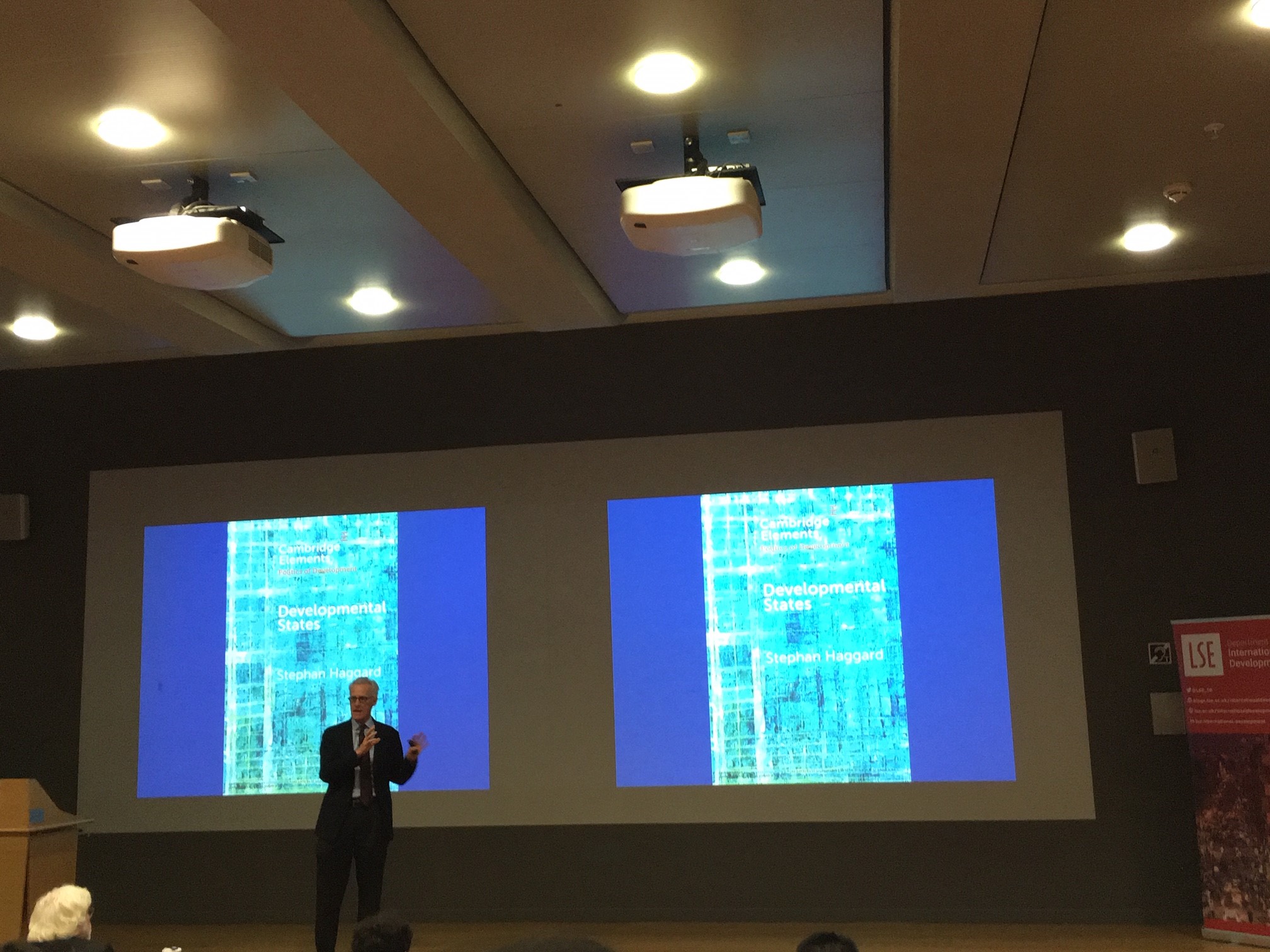On Friday, 8 February, Stephan Haggard from the University of California San Diego gave a compelling talk on “Developmental States” for the International Development Department’s Cutting Edge Issues in Development lecture series. Here’s what two of the Department’s students took away from the lecture.

On a particularly miserable February night (*as a Brit I’d like to apologise to my international friends for the weather and promise things can only get better), International Development students found momentary respite from the wind and rain as we took part in a fascinating conversation with Dr Stephan Haggard to discuss his recently published book, “Developmental States”.
The concept of the “Developmental State” was originally coined by Chalmers Johnson to explain the rapid growth and structural transformation of post-World War Two Japan, and was later used in relation to the East Asian Tiger economies. Haggard stated that the success of these countries led to the emergence of a heterodox body of literature in the late 20th century which proposed that their economic growth was contingent on the state playing an active role in creating the conditions for the market to work in a (somewhat) efficient and effective manner.
While the relationship between the state and the market differed from country-to-country, Haggard argued that across the East Asian economies there were similar government interventions which proved vitally important to their success. Of those mentioned by Haggard (*and at the risk of over-simplification), three of these interventions struck me as of particular significance. First, the state directed resources into industries it recognised as being of high value and in which the country had a comparative advantage (e.g. the electronics industry in South Korea). This was not simply a process of “picking winners”. Instead, the state encouraged experimentation in an attempt to find the industries that would bring about economic growth. Second, the state made early investments into education and technology. These are costs generally not borne by the market, however, they are vital in the development of competitive industries. Third, the state created capacity, particularly through the development of an effective bureaucracy. This was achieved through well-designed recruitment and incentivisation, with bureaucrats in these countries “attuned to the collective good”.
Haggard explained that while the Developmental State is a concept generally associated with the East Asian countries, that is not to say these particular conditions have not been seen elsewhere. In fact, almost all the developed countries who have experienced comparable growth have relied upon similar synergies between the state and the market. None more so than the United States, who, thanks in large part to the ideas of former Founding Father, now star of Broadway – Alexander Hamilton – relied heavily on state involvement (e.g. high tariffs) in managing and protecting the market during much of the 19th and early 20th centuries. This raises the question: is it possible for developmental states to exist today? Haggard argued “yes”, expressing that while the international environment does bring its challenges, there is still the policy space for the state to play an important role in creating the necessary conditions to bring about economic growth and structural transformation.
Jack Renner is an MSc Development Studies candidate. Prior to this he spent five years working as a consultant specialising in financial crime. His primary research interests are in the role of education and agriculture in development, with a particular focus on East Africa. He recently moved back from Hong Kong and misses the beach/weather.
_______________
The development of “economically backward” societies remains the Holy Grail for academics working in political science and economics. Even though the end goal or target is clear (i.e. economic growth and structural transformation), the means to achieve this are unclear, or, at least, hotly debated by neoclassical economists (who support neoliberalism) and their heterodox interlocutors (who make the case for the “developmental state”). With the battle lines drawn, it is clear where Professor Stephan Haggard stands; he belongs to the long tradition that stretches back to List, Schmoller and Gerschenkron who argue in favour of state intervention. A Political Scientist by training, he makes a convincing argument for the heterodox camp and the “developmental state”.
Global public policy and development policy are still within the choke hold of neoliberalism and the policy instruments that serve it, mainly the Washington Consensus. This ideological capture serves no one but the few Davos-attending elites and corporations who benefit from this paradigm, both politically and economically. Bliss will be the day the world wakes to news headlines like: “The End of Neoliberalism”, “The End of the Washington Consensus” or the Nietzschean variants: “Neoliberalism is Dead”, “The Washington Consensus is Dead”. Considering the devastation that the neoliberal and Washington Consensus crusade have caused on their march through territories around the world (especially in sub-Saharan Africa during Structural Adjustment Programmes and later leading the North Atlantic region into a Financial Crisis), one should think the time is ripe to bury this ideology and write its obituary. But no. We are still witnessing the “Strange Non-Death of Neoliberalism”. Could it be that, truly, “there are no alternatives”? Besides “getting prices right” or allowing the theorems of neoclassical economics to determine the allocation of resources, are there other options available at the “marketplace of ideas”? Enter the “developmental state”.
Stephan Haggard presents the “developmental state” as a viable alternative. Until the emergence of the newly industrialised East Asian economies, Professor Haggard pointed out, “the neoclassical economists/theorists who saw the liberalisation of trade and the reform of the exchange rate regime as the crucial policy tools for economic growth did not have any cases they could point to as successes”. Quite conveniently, when these success stories emerged from the East, a group of neoclassical economists were quick to “grab unto these” as evidence of countries that grew through liberalization and applications of the Washington Consensus, according to Stephan Haggard. But, before they could get away with it, Alice Amsden, Robert Wade and Ha-Joon Chang would expose this slight of hand, and provide an appropriate explanation for the rise of East Asian countries through the analytical prism of “developmental state”. Alice Amsden’s “most controversial point” was that the East Asian countries industrialized by “getting prices wrong”, a fact which is the direct opposite of neoclassical thinking.
What the “developmental state” does is: 1. monitor the activities within an economy and 2. actively coordinate things in a manner that leads to structural transformation. In the words of Amsden again, the “developmental state” sharpens a “control mechanism” that “imposes discipline on economic behaviour”. The state does not naively leave things to the “invisible hand of the market” but plays an active role. The “developmental state” provides institutions like an autonomous and competent bureaucracy who identify new avenues for growth, direct investments, suggest innovations to local firms and more generally, in the words of Robert Wade, “govern the market”. If an economy is viewed as a complex system, almost similar to a biological system, with lots of moving parts and connections, requiring “selective interventions” and coordination, then the entity better suited to managing this task is the “developmental state” and not the market, Stephan Haggard emphasized.
Finally, since the coordination problems of Ghana would be different from the coordination problems of Venezuela, Nigeria or Rwanda, it is worth stressing that developmental-state is not a one-size-fits-all model. Today’s developing countries should be wise to start shopping for ideas and implementable strategies within the “developmental state” literature and put aside the handbook of neoclassical economics.
Noble Kofi Nazzah is an MSc African Development candidate at the LSE and holds a BSc in Chemistry from the University of Ghana. Noble’s research interests include industrial policy and economic development in sub-Saharan Africa.
This Friday, 15 February, we’ll have Barbara Harriss-White from Oxford University speaking on “Development, Big Business, and the Environment”. The lecture takes place from 4-6pm in the Sheikh Zayed Theatre in the New Academic Building. The series is open to LSE Students and Faculty. Other external guests should visit https://bit.ly/2AxvWVG to reserve a seat.
The views expressed in this post are those of the author and in no way reflect those of the International Development LSE blog or the London School of Economics and Political Science.





